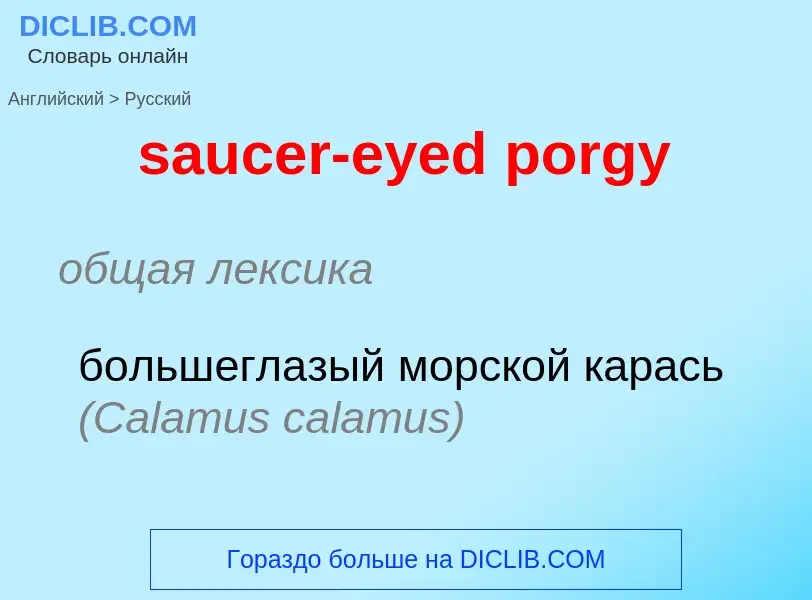Tradução e análise de palavras por inteligência artificial ChatGPT
Nesta página você pode obter uma análise detalhada de uma palavra ou frase, produzida usando a melhor tecnologia de inteligência artificial até o momento:
- como a palavra é usada
- frequência de uso
- é usado com mais frequência na fala oral ou escrita
- opções de tradução de palavras
- exemplos de uso (várias frases com tradução)
- etimologia
saucer-eyed porgy - tradução para russo
общая лексика
большеглазый морской карась (Calamus calamus)
['sɔ:sə]
существительное
общая лексика
чайное блюдце
поддон(ник)
блюдце
поддонник
устаревшее выражение
соусник
Definição
Wikipédia
Porgy and Bess () is an English-language opera by American composer George Gershwin, with a libretto written by author DuBose Heyward and lyricist Ira Gershwin. It was adapted from Dorothy Heyward and DuBose Heyward's play Porgy, itself an adaptation of DuBose Heyward's 1925 novel of the same name.
Porgy and Bess was first performed in Boston on September 30, 1935, before it moved to Broadway in New York City. It featured a cast of classically trained African-American singers—a daring artistic choice at the time. A 1976 Houston Grand Opera production gained it a renewed popularity after languishing in the doldrums of the 1960s and early 1970s, and it is now one of the best known and most frequently performed operas.
The libretto of Porgy and Bess tells the story of Porgy, a disabled black street beggar living in the slums of Charleston. It deals with his attempts to rescue Bess from the clutches of Crown, her violent and possessive lover, and Sportin' Life, her drug dealer. The opera plot generally follows the stage play.
In the years following Gershwin's death, Porgy and Bess was adapted for smaller-scale performances. It was adapted as a film in 1959. Some of the songs in the opera, such as "Summertime", became popular and are frequently recorded. In the late 20th and early 21st centuries, the trend has been toward productions with greater fidelity to Gershwin's original intentions, though smaller-scale productions also continue to be mounted. A complete recorded version of the score was released in 1976; since then, it has been recorded several times.

![[[John W. Bubbles]] as Sportin' Life in the original Broadway production of ''Porgy and Bess'' (1935) [[John W. Bubbles]] as Sportin' Life in the original Broadway production of ''Porgy and Bess'' (1935)](https://commons.wikimedia.org/wiki/Special:FilePath/John W. Bubbles.jpg?width=200)

.jpg?width=200)
![[[Ruby Elzy]] as Serena in the original Broadway production of ''Porgy and Bess'' (1935) [[Ruby Elzy]] as Serena in the original Broadway production of ''Porgy and Bess'' (1935)](https://commons.wikimedia.org/wiki/Special:FilePath/Ruby Elzy (1935).jpg?width=200)
.jpg?width=200)
![Saucer, 1753, soft-paste porcelain with enamel and gilt decoration, [[Cleveland Museum of Art]] (USA) Saucer, 1753, soft-paste porcelain with enamel and gilt decoration, [[Cleveland Museum of Art]] (USA)](https://commons.wikimedia.org/wiki/Special:FilePath/Clevelandart 1989.188.jpg?width=200)
![1844–1847}}, [[porcelain]], diameter: 14.6 cm, [[Metropolitan Museum of Art]] (New York City) 1844–1847}}, [[porcelain]], diameter: 14.6 cm, [[Metropolitan Museum of Art]] (New York City)](https://commons.wikimedia.org/wiki/Special:FilePath/Cup and Saucer MET DP236356.jpg?width=200)


![[[Faience]] saucer of the [[Maison Losseau]] collections [[Faience]] saucer of the [[Maison Losseau]] collections](https://commons.wikimedia.org/wiki/Special:FilePath/Petite sous-tasse en Faïence de madame Desmette - Maison Léon Losseau.jpg?width=200)
